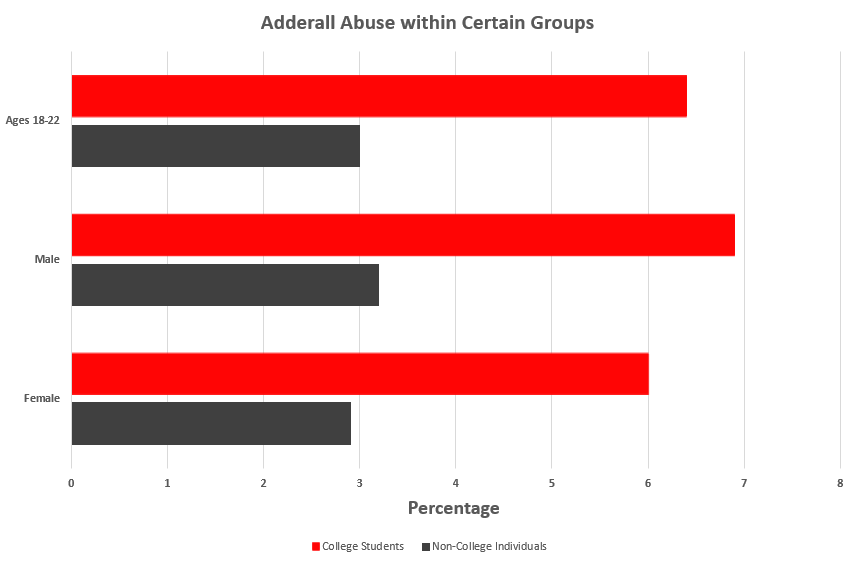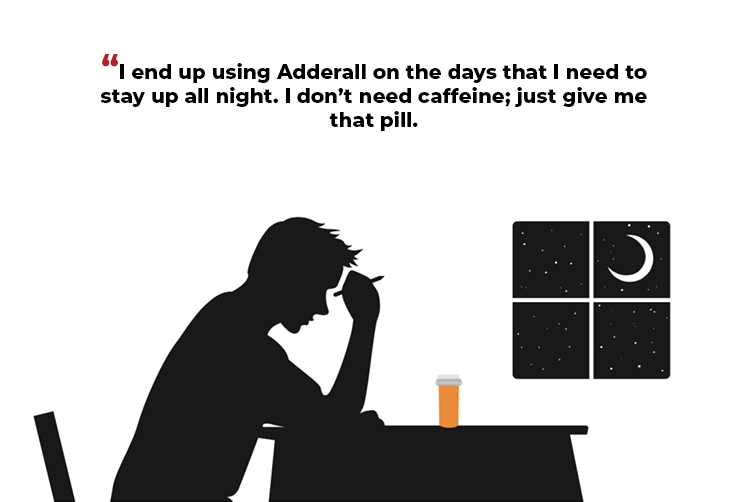
By Andrew Doran
(*Editor’s note: All the names of students have been changed in order to protect their identity and prevent repercussions from future professors or from the University.)
It is 2 a.m. and Brianna Reyes* is having a hard time trying to concentrate on her homework that is due in 12 hours. She is contemplating going to bed and just giving up, but she knows that not finishing will cause her to start failing the class.
As Reyes debates what to do, she remembers that she has some pills in her drawer that will allow her to concentrate more and hopefully allow her to power through the rest of the night. She opens her desk drawer to rummage her hand around the back in order to find her illegal supply of Adderall pills.
After she gets out her bottle, she takes one and allows 30 minutes to feel the effects of the drug. She starts to feel more awake and focused on completing her assignment.
With the Adderall in her system, she is able to power through her tiredness and completes the homework by 6 a.m. She was focused the entire time, an effect she knew the drug would give her. “I know that when I take Adderall, if I can stay focused, I can get anything done that I’ve put off,” said Reyes.
“All I needed to do was ask three different people in the dorm and I was able to get my hook up.
Reyes is not the only student taking Adderall at CI. In talking with students, faculty and professors, it is apparent that CI is not immune to the issues of Adderall abuse and the side effects that come with it. In multiple interviews with students, it is fairly clear that if someone wants to take Adderall, all they need to do is simply ask a person or two and they will be able to find their own supply of it.
Matthew Paul*, a senior biology major, described the first time he was able to get Adderall as a freshman. “It was fairly easy,” said Paul. “All I needed to do was ask three different people in the dorm and I was able to get my hook up. There was usually only one or two degrees of separation before I was able to get my supply.”
While this was the most common way for students to receive their Adderall, some students would lie to their doctor in order to get some. “I went to the doctors and lied about my symptoms,” explained Marsha Jones*, a junior communication major. “Since it’s a focusing diagnosis, the doctor has a hard time knowing if you are telling the truth or not. I would just follow what was said online and within an hour, I had my own cheap supply of Adderall.”
Adderall is a drug that is commonly used with individuals that have either Attention Deficit Disorder or Attention Deficit Hyperactivity Disorder, more commonly known as ADD or ADHD. When someone has either of these disorders, they have a hard time calming down their mind in order to complete tasks at hand, so they are prescribed Adderall in order to focus on tasks like doing homework or working in an office.
Senior English major, Elizabeth Watts*, who does have ADHD, talked about how her life is totally different from when she was undiagnosed to today where she has it under control. Visiting the doctors to get help, the doctor knew right away that she needed Adderall in order to keep her mind on track. “When I didn’t have this diagnosis, I was all over the place. I could never pay attention in class or get anything done fully.”
Once she started to take the drug, she saw an immediate difference. “I was able to hold conversations, do homework, everything! It was really great for me because I was able to take control of my life in a weird sort of way.”
When Adderall is used for its intended purpose, it can be a lot of help to individuals who have a hard time maintaining their focus. But with so many students who do not have ADD or ADHD taking Adderall, it creates awkward situations for students who actually need it. Watts mentioned that she has had a lot of her fellow peers approach her attempting to buy some of her medication.

“It’s really not cool,” said Watts. “I need Adderall to function, but people think I don’t need it every day. It makes me feel bad that I can’t help my friends, but it’s honestly bulls— that so many people are taking it in order to cover up their procrastination.”
Whether students want to admit it or not, and a majority would not, individuals who are nonprescription Adderall users are breaking the CI Student Code of Conduct. According to the document, the ninth point states that the “Use, possession, manufacture, or distribution of illegal drugs or drug-related paraphernalia, (except as expressly permitted by law and University regulations) or the misuse of legal pharmaceutical drugs” is against the school guidelines. This means that if a student is caught using Adderall without a prescription, they would have to face the consequences given to them by the student conduct office, which could be suspension or expulsion.
In addition to breaking point nine of the document, students could also be breaking point 1-1, which states that students are breaking the code by “Cheating, (committing) plagiarism, or (engaging in) other forms of academic dishonesty that are intended to gain an unfair academic advantage”. While this might be more of a gray area compared to point nine, for those who do not need the drug, Adderall can help them stay focused to a hyper level, as well as stay up all night.
“I end up using Adderall on the days that I need to stay up all night. I don’t need caffeine; just give me that pill,” remarked Paul. When pressed about if he thought this was breaking the CI Code of Conduct, Paul gently explained that caffeine is not against the law, therefore Adderall should be treated the same.
“I don’t see why that would be against the code (of conduct). There are plenty of students that are drinking those massive energy drinks at midnight to stay up. Why would taking Adderall be any different?”
According to Chelsee Bente, the Associate Dean of Students, the University would likely put a student on probation if they were to get caught taking Adderall without a prescription.
“It could be anywhere from disciplinary probation to suspension, but most likely probation with some educational sanctions attached to it,” explained Bente. “It might be doing a course about alcohol and other drugs or why you don’t take something that is not prescribed to you … There’s a variance in what we might do.”
When asked about how often the University gets complaints about the amount of Adderall use on campus, Bente was open with her answer. The University simply does not get a lot of cases of Adderall misuse.
When asked more as to why that is, Bente expanded further. “It’s kind of a quiet thing … It’s not something that’s out in the open. You can’t smell it like you can marijuana or alcohol. Behavior is not so erratic either, so it’s harder to gauge what the issue is.”
Even though some of the students who were interviewed understood that they might be breaking the student code of conduct, they believed that they would always be able to get away from punishment.
“None of my friends are going to rat me out, so why worry? Also, there is no way that the University would be able to implicate me,” said Krystal Finch*, a senior communication major. When asked to explain this further, Finch talked about how the University would never be able to come down on anyone. “Look, it’s almost like drinking underage. People might say you do it, and you might do it, but unless there is hard proof, like a photo or something, there is no way that the University can say you’re breaking the school code (of conduct).”
Jones also echoed this sentiment as well. “Even if the University thinks I’m taking Adderall, what are they going to do? Nothing. They can’t prove it’s Adderall unless they take a blood sample, but I take Adderall at night, so they are never going to catch me.”
All nonprescription Adderall users interviewed shared the same attitude: it is not cheating. “Adderall can take my head anywhere, so even if I want to do homework, sometimes I end up cleaning my room. Yeah, it might let me focus, but like other college students, I might end up doing something completely different,” said Reyes “I’ve found myself down a massive YouTube rabbit hole sometimes, and then I’ll come out of it hours later not getting my work done and I’ve wasted a pill.”
Watts though, who does take it for ADHD, disagrees. “Yeah, it’s cheating. It might not be the same as cheating on a test or plagiarizing a paper, but it’s cheating nonetheless.”
While students and the University administration might be at odds when it comes to knowing if Adderall is cheating, there is no denying that Adderall is still a drug that needs to be used with caution.
According to multiple addiction websites, including the American Addiction Center, RxList and the Mayo Clinic, Adderall still has a long list of side effects. They can include an upset stomach, increased anxiety, problems with sleeping and a loss of appetite. In serious cases, after a lot of long-term use, people have died from taking too much Adderall because they never learned how to dose properly.
“ It’s kind of a quiet thing … It’s not something that’s out in the open.
All these short-term side effects were something the nonprescription using students felt, especially if it was their first time taking the drug. A couple of the students talked about how their bodies just felt weird, and they almost stopped taking the drug. In the end, though, they saw how much work they were able to complete while being on the drug, so they kept taking it.
“I just learned how to deal with the side effects. I also only started to use Adderall when I needed it, so I didn’t feel bad all the time,” explained Paul.
The students that were interviewed refused to believe that they would have any long-term side effects. The majority of them believe that they will only be taking Adderall until they graduate from CI and then they will go off it immediately. “I don’t see a reason as to why I would need to take it after school. It’s not like I’ll need to do homework with a full-time job,” said Reyes.
Even though students across campus are taking Adderall, and it is easier to get than other drugs on campus, it is still an illegal drug unless you have a prescription. According to the U.S. Department of Justice, Adderall is classified as a Class II controlled drug, meaning that the drug has a high potential for addiction and abuse like other drugs such as OxyContin and morphine.
Possession of the Class II controlled drug, Adderall, without a prescription means there are serious consequences to be had. According to multiple attorneys from around California, if someone has the drug without a prescription they can be charged with a misdemeanor, meaning that they will either have to pay a fine up to $1,000 or go to state jail for 364 days. If someone is found to be selling Adderall, that ends up being a felony, thus making jail time three to five years.
Even though selling the drug is illegal, it still does not deter anyone from pushing them. “Yeah, I know people that sell the drug,” said Watts. “They aren’t scared of doing it because they end up getting a lot of money for their supply.”
However, the price of the pill varies. A couple of students were paying as little as $5 per pill, while others were paying upwards of $15 per pill. There were students that The CI View talked to who did not want to be interviewed but were willing to admit that they pay $20-30 per pill.
There were multiple reasons as to why pill prices were on a varying price range. Sometimes it had to do with the connection that the seller had with the buyer, or how many pills the seller had at their discretion.
“Look, when I’m paying someone for Adderall, they end up getting a Venmo from me for whatever that seller’s price is,” said Reyes. “But I’m not an idiot. It’s not like I’m putting ‘Thanks for the Adderall’ in the payment message. I just put emojis of food or something that is in common between me and the seller.”
Paul agreed to this. “I’m never paying with cash, because who has that now? All the conversations are verbal, so there is no trail, and then I pay via apps (such as Venmo and CashApp) with emojis about food so it looks like I was paying back for lunch.”
Overall, it seems students are more worried about achieving their academic goals than the legal or health related consequences that come from taking nonprescription drugs.
With this silent problem brought to light, it will be interesting to see how the University, as well as students, change their perspective on Adderall.

